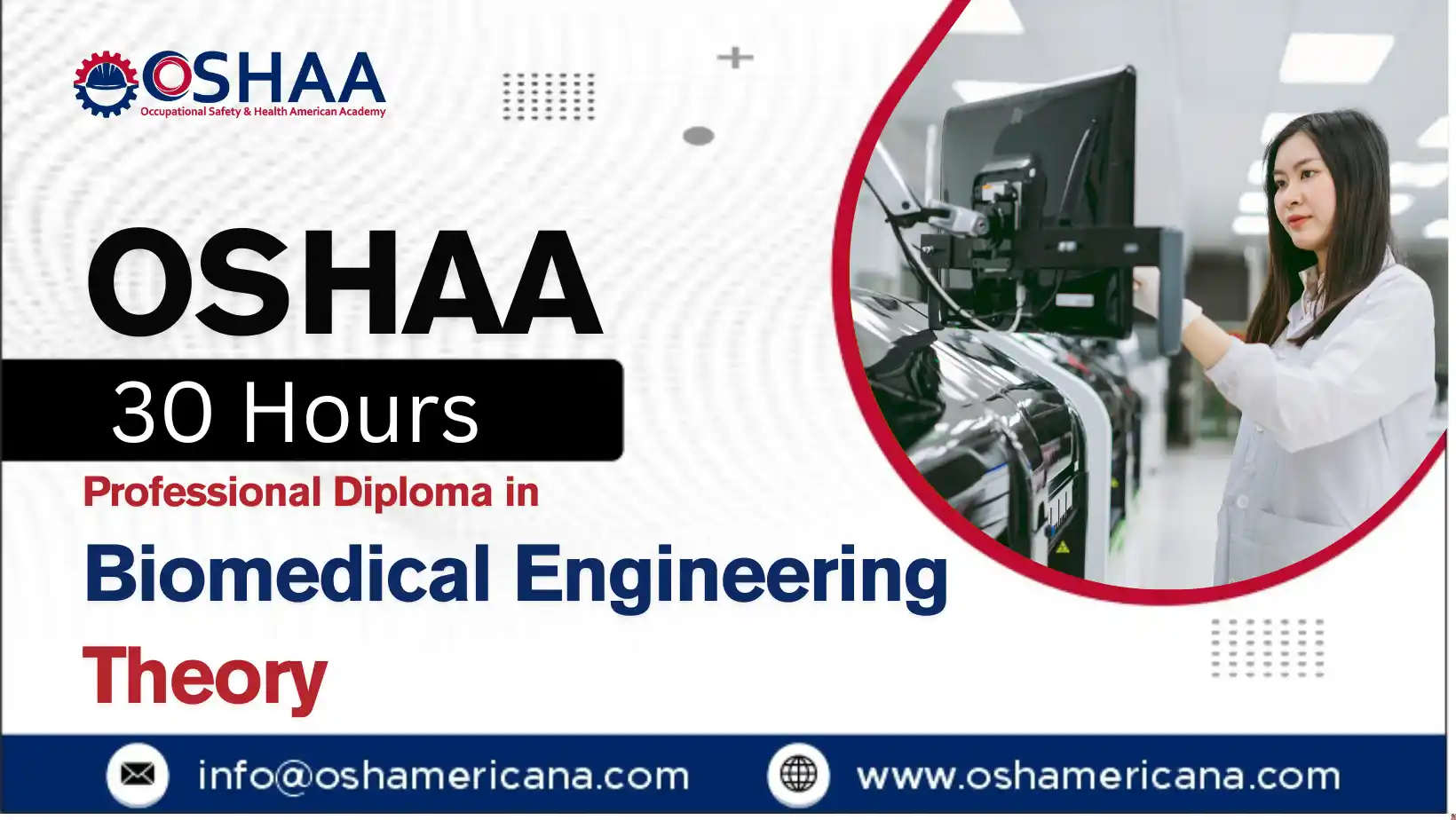Biomedical engineering is at the intersection of healthcare, science, and engineering, offering transformative solutions to medical challenges through innovation and technology. As healthcare systems become increasingly reliant on advanced medical devices and diagnostic tools, the demand for foundational knowledge in biomedical engineering continues to grow. The OSHAA 30-Hours Professional Diploma in Biomedical Engineering Theory is designed to equip participants with a clear, structured understanding of the core concepts that underpin this vital and evolving field.
The OSHAA Diploma in Biomedical Engineering Theory introduces participants to the scientific principles and engineering concepts essential to the development, evaluation, and application of medical technologies. This theory-focused programme covers a wide spectrum of topics relevant to healthcare technology, without requiring prior technical expertise, making it ideal for those aiming to enter the field or expand their interdisciplinary knowledge.
Through 30 hours of expert-led instruction, participants will explore the theoretical foundations of biomedical devices, systems, and procedures, understanding how they integrate with human biology to support diagnosis, monitoring, treatment, and rehabilitation.
OSHAA’s Professional Diploma in Biomedical Engineering Theory stands out for its clarity, academic depth, and practical relevance. Developed by experienced educators and reviewed for alignment with current healthcare and engineering standards, this diploma provides participants with the confidence and competence to engage with biomedical concepts in professional or academic contexts.
The OSHAA 30-Hours Professional Diploma in Biomedical Engineering Theory offers participants a focused, accessible, and professionally valuable introduction to the principles that drive innovation in medical technology. With a curriculum grounded in theory and aligned with current industry standards, this course provides a stepping stone for further academic pursuit or career development in the dynamic and impactful field of biomedical engineering.
OSHAA 30-Hours Professional Diploma in Biomedical Engineering Theory
Study Units
Learning Outcomes
Introduction to Biomedical Engineering and Its Interdisciplinary Scope (3 hours)
- Understand the role of biomedical engineering within healthcare systems
- Recognise the interdisciplinary connections between engineering, biology, and medicine
- Identify major areas of biomedical engineering application
- Explore the historical development and future trends of the field
Fundamentals of Human Anatomy and Physiology for Engineers (3 hours)
- Gain an overview of human organ systems relevant to biomedical device design
- Understand basic physiological processes and their interaction with technology
- Identify anatomical terminology used in clinical and engineering contexts
- Relate human biology to the design and function of biomedical systems
Biomedical Signals and Systems: Theoretical Foundations (4 hours)
- Understand the nature and types of biomedical signals
- Learn about the principles of signal acquisition, processing, and interpretation
- Explore common bioelectrical signals such as ECG, EEG, and EMG
- Examine system modelling and signal filtering techniques
Principles of Biomechanics and Human Movement Modelling (4 hours)
- Understand the mechanical properties of biological tissues
- Apply physics and engineering principles to human movement
- Analyse joint motion, forces, and body mechanics
- Explore applications of biomechanics in rehabilitation and prosthetics
Theoretical Concepts in Bioinstrumentation and Sensor Technologies (6 hours)
- Understand the theoretical principles behind medical sensors and instruments
- Learn about transduction methods used in physiological measurement
- Examine signal conditioning and data conversion processes
- Identify performance parameters including sensitivity, accuracy, and reliability
- Explore design considerations for safe and effective instrumentation
- Understand calibration and maintenance of bioinstrumentation systems
Medical Imaging Systems: Physics and Interpretation (5 hours)
- Understand the physical principles behind common imaging modalities
- Learn how X-ray, MRI, ultrasound, and CT systems function
- Explore the process of image formation, contrast, and resolution
- Recognise clinical applications and limitations of each imaging technique
- Interpret basic medical images for anatomical and diagnostic relevance
Introduction to Therapeutic and Assistive Device Theory (3 hours)
- Understand the engineering principles behind therapeutic and assistive devices
- Explore theoretical concepts used in the development of prosthetics, orthotics, and mobility aids
- Identify the needs and challenges addressed by assistive technologies
- Learn about the integration of mechanical and electronic systems in therapeutic applications
Electrical and Mechanical Interfaces in Biomedical Systems (2 hours)
- Understand how electrical and mechanical components interact in biomedical devices
- Identify key interface elements such as connectors, circuits, and actuators
- Explore theoretical models of device-body interaction
- Recognise safety and performance factors in interface design
Course Benefits – OSHAA 30-Hours Professional Diploma in Biomedical Engineering Theory
- Gain a structured understanding of the core theoretical foundations of biomedical engineering
- Develop interdisciplinary knowledge that bridges engineering principles with biological and clinical applications
- Build analytical skills to interpret and assess the functionality of biomedical devices and systems
- Improve understanding of human physiology from an engineering perspective, essential for designing health-related technologies
- Learn about the theoretical basis of medical imaging, biomechanics, and bioinstrumentation
- Explore current and emerging concepts in therapeutic and assistive device design
- Enhance professional development in healthcare technology, research, or medical device industries
- Prepare for further academic study or applied training in biomedical and clinical engineering fields
- Strengthen career prospects in research, healthcare support, medical technology development, or regulatory services
- Earn a recognised diploma aligned with UK professional standards and continuing professional development (CPD) frameworks
This course is designed for participants who are interested in understanding the theoretical foundations of biomedical engineering and its applications within healthcare and medical technology. It is suitable for individuals from a range of academic and professional backgrounds who wish to gain insight into the principles that guide the development and function of medical systems and devices.
This course is ideal for:
- Participants with a background in science, engineering, or healthcare seeking to explore the field of biomedical engineering
- Professionals in medical technology, research, or clinical support roles looking to enhance their theoretical knowledge
- Engineers aiming to apply their expertise within a healthcare or life sciences context
- Researchers and academics working at the intersection of biology, medicine, and engineering
- Healthcare professionals interested in understanding how biomedical technologies integrate with clinical practice
- Individuals preparing for further study or career development in biomedical or clinical engineering
This diploma offers valuable preparation for those entering or advancing within the biomedical sector by delivering essential theoretical knowledge in a structured, professionally recognised format.







